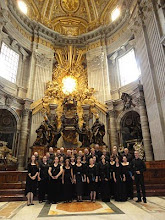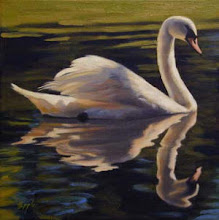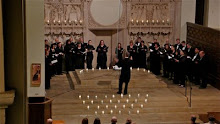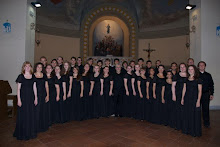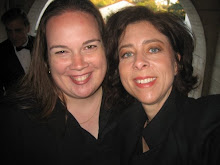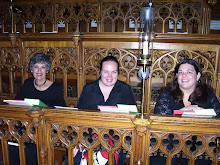 , after voice auditions and the voice department meeting, Ben Brecher (head of the voice department) got us in to the dress rehearsal for the world premiere of Stephen Schwartz's opera, Seance on a Wet Afternoon. Amazing! So creepy. Wonderful set and passionate singing. Very dramatic even if reminiscent of musical theater. Very enjoyable.
, after voice auditions and the voice department meeting, Ben Brecher (head of the voice department) got us in to the dress rehearsal for the world premiere of Stephen Schwartz's opera, Seance on a Wet Afternoon. Amazing! So creepy. Wonderful set and passionate singing. Very dramatic even if reminiscent of musical theater. Very enjoyable.Third, 2 days later, Stephen Schwartz came to  UCSB for an interview/Q&A session for the theater and music departments. I'm not a huge fan of most musical theater (Wicked included) but, he was very interesting. Not only did he write Godspell and Pippin :( but Prince of Egypt! :) As well as the lyrics for Pocahontas, Hunchback of Notre Dame and Enchanted. He said that he realizes that 98% of new operas never get performed after their premiere. He also said that he might write another in the future but doesn't have anything on the horizon.
UCSB for an interview/Q&A session for the theater and music departments. I'm not a huge fan of most musical theater (Wicked included) but, he was very interesting. Not only did he write Godspell and Pippin :( but Prince of Egypt! :) As well as the lyrics for Pocahontas, Hunchback of Notre Dame and Enchanted. He said that he realizes that 98% of new operas never get performed after their premiere. He also said that he might write another in the future but doesn't have anything on the horizon.
 UCSB for an interview/Q&A session for the theater and music departments. I'm not a huge fan of most musical theater (Wicked included) but, he was very interesting. Not only did he write Godspell and Pippin :( but Prince of Egypt! :) As well as the lyrics for Pocahontas, Hunchback of Notre Dame and Enchanted. He said that he realizes that 98% of new operas never get performed after their premiere. He also said that he might write another in the future but doesn't have anything on the horizon.
UCSB for an interview/Q&A session for the theater and music departments. I'm not a huge fan of most musical theater (Wicked included) but, he was very interesting. Not only did he write Godspell and Pippin :( but Prince of Egypt! :) As well as the lyrics for Pocahontas, Hunchback of Notre Dame and Enchanted. He said that he realizes that 98% of new operas never get performed after their premiere. He also said that he might write another in the future but doesn't have anything on the horizon.
Fourth, 6 days later, Thomas Hampson, world-class Baritone gave a lecture in association with the Library of Congress on American Song and a masterclass at UCSB that I was lucky enough to participate in. My friend Daniel Tuutau filmed it on his cell phone (is filmed the right word?) and I might be able to get it posted. Mr. Hampson talked a lot about hearing it like you want it to sound before opening your mouth, breath technique, posture, and balance, and having a clear understanding of what you and the music are portraying.
Fifth, that night, Thomas Hampson gave a recital for UCSB Arts and Lectures in Campbell Hall. Because I sang in the masterclass I received two tickets to that night's recital. They were front row center! He was wonderful! I've been to a lot of voice recitals but I had never been moved more. The highlights for me were 1, a setting of Lincoln's letter to Mrs. Bixby. So amazing and moving. 2, the setting of William Blake's Tiger, Tiger. I have heard many settings of this text and love to hear the different interpretations. This composer used heavy dissonance throughout until the stanza where the poet asks, "did He who make the lamb make thee?" Here the song became piano, lyrical and reverent. Of course, Thomas Hampson handled it beautifully. 3, Our new baritone teacher, Paul came up to sit by us (snuck up to the good seats) and pointed out to me on the program which pieces he thought I should look at. I was pretty stunned since he's only heard me sing twice, and flattered when I heard the songs and immediately knew I wanted to study them. and 4, the last highlight of the evening for me was when as his first encore he sang Shenandoah. The moment he started singing my tears started falling. It was the most amazing audience moment of my life. (Corny, I know. But true.) When he finished we leaped back to our feet and I realized that the 4 of us, Rebecca, Annie, Alyssa, and I were all crying! Too funny. What is this a Beetles concert? In Italy I shared a room with Blythe and Rebecca and one evening as we were getting ready for our concert we sang. One of the songs we sang was Shenandoah. I sang the melody and Blythe and Rebecca would improvise harmonies. I first learned Shenandoah back in vocal technique class at SBCC. Along with Danny Boy and The River is Wide I had the opportunity to study these American folk songs and have been able to sing them since. All of this adding to the experience of hearing Mr. Hampson sing such a hauntingly beautiful tune.
in Campbell Hall. Because I sang in the masterclass I received two tickets to that night's recital. They were front row center! He was wonderful! I've been to a lot of voice recitals but I had never been moved more. The highlights for me were 1, a setting of Lincoln's letter to Mrs. Bixby. So amazing and moving. 2, the setting of William Blake's Tiger, Tiger. I have heard many settings of this text and love to hear the different interpretations. This composer used heavy dissonance throughout until the stanza where the poet asks, "did He who make the lamb make thee?" Here the song became piano, lyrical and reverent. Of course, Thomas Hampson handled it beautifully. 3, Our new baritone teacher, Paul came up to sit by us (snuck up to the good seats) and pointed out to me on the program which pieces he thought I should look at. I was pretty stunned since he's only heard me sing twice, and flattered when I heard the songs and immediately knew I wanted to study them. and 4, the last highlight of the evening for me was when as his first encore he sang Shenandoah. The moment he started singing my tears started falling. It was the most amazing audience moment of my life. (Corny, I know. But true.) When he finished we leaped back to our feet and I realized that the 4 of us, Rebecca, Annie, Alyssa, and I were all crying! Too funny. What is this a Beetles concert? In Italy I shared a room with Blythe and Rebecca and one evening as we were getting ready for our concert we sang. One of the songs we sang was Shenandoah. I sang the melody and Blythe and Rebecca would improvise harmonies. I first learned Shenandoah back in vocal technique class at SBCC. Along with Danny Boy and The River is Wide I had the opportunity to study these American folk songs and have been able to sing them since. All of this adding to the experience of hearing Mr. Hampson sing such a hauntingly beautiful tune.
 in Campbell Hall. Because I sang in the masterclass I received two tickets to that night's recital. They were front row center! He was wonderful! I've been to a lot of voice recitals but I had never been moved more. The highlights for me were 1, a setting of Lincoln's letter to Mrs. Bixby. So amazing and moving. 2, the setting of William Blake's Tiger, Tiger. I have heard many settings of this text and love to hear the different interpretations. This composer used heavy dissonance throughout until the stanza where the poet asks, "did He who make the lamb make thee?" Here the song became piano, lyrical and reverent. Of course, Thomas Hampson handled it beautifully. 3, Our new baritone teacher, Paul came up to sit by us (snuck up to the good seats) and pointed out to me on the program which pieces he thought I should look at. I was pretty stunned since he's only heard me sing twice, and flattered when I heard the songs and immediately knew I wanted to study them. and 4, the last highlight of the evening for me was when as his first encore he sang Shenandoah. The moment he started singing my tears started falling. It was the most amazing audience moment of my life. (Corny, I know. But true.) When he finished we leaped back to our feet and I realized that the 4 of us, Rebecca, Annie, Alyssa, and I were all crying! Too funny. What is this a Beetles concert? In Italy I shared a room with Blythe and Rebecca and one evening as we were getting ready for our concert we sang. One of the songs we sang was Shenandoah. I sang the melody and Blythe and Rebecca would improvise harmonies. I first learned Shenandoah back in vocal technique class at SBCC. Along with Danny Boy and The River is Wide I had the opportunity to study these American folk songs and have been able to sing them since. All of this adding to the experience of hearing Mr. Hampson sing such a hauntingly beautiful tune.
in Campbell Hall. Because I sang in the masterclass I received two tickets to that night's recital. They were front row center! He was wonderful! I've been to a lot of voice recitals but I had never been moved more. The highlights for me were 1, a setting of Lincoln's letter to Mrs. Bixby. So amazing and moving. 2, the setting of William Blake's Tiger, Tiger. I have heard many settings of this text and love to hear the different interpretations. This composer used heavy dissonance throughout until the stanza where the poet asks, "did He who make the lamb make thee?" Here the song became piano, lyrical and reverent. Of course, Thomas Hampson handled it beautifully. 3, Our new baritone teacher, Paul came up to sit by us (snuck up to the good seats) and pointed out to me on the program which pieces he thought I should look at. I was pretty stunned since he's only heard me sing twice, and flattered when I heard the songs and immediately knew I wanted to study them. and 4, the last highlight of the evening for me was when as his first encore he sang Shenandoah. The moment he started singing my tears started falling. It was the most amazing audience moment of my life. (Corny, I know. But true.) When he finished we leaped back to our feet and I realized that the 4 of us, Rebecca, Annie, Alyssa, and I were all crying! Too funny. What is this a Beetles concert? In Italy I shared a room with Blythe and Rebecca and one evening as we were getting ready for our concert we sang. One of the songs we sang was Shenandoah. I sang the melody and Blythe and Rebecca would improvise harmonies. I first learned Shenandoah back in vocal technique class at SBCC. Along with Danny Boy and The River is Wide I had the opportunity to study these American folk songs and have been able to sing them since. All of this adding to the experience of hearing Mr. Hampson sing such a hauntingly beautiful tune.Sixth, the next night, (tonight), Rebecca and I went to the METs live br oadcast, at the Music Academy of the West, of Puccini's Tosca. You know I love Puccini, and you know I love Tosca. This opera has three solid gold arias that you will find on any and all best of opera recordings. Puccini knows when to bring these achingly strong and gut-wrenching melodies back at just the right moment to remind us why his operas never left the standard repertoire and why Tosca is "the opera of operas."
oadcast, at the Music Academy of the West, of Puccini's Tosca. You know I love Puccini, and you know I love Tosca. This opera has three solid gold arias that you will find on any and all best of opera recordings. Puccini knows when to bring these achingly strong and gut-wrenching melodies back at just the right moment to remind us why his operas never left the standard repertoire and why Tosca is "the opera of operas."
 oadcast, at the Music Academy of the West, of Puccini's Tosca. You know I love Puccini, and you know I love Tosca. This opera has three solid gold arias that you will find on any and all best of opera recordings. Puccini knows when to bring these achingly strong and gut-wrenching melodies back at just the right moment to remind us why his operas never left the standard repertoire and why Tosca is "the opera of operas."
oadcast, at the Music Academy of the West, of Puccini's Tosca. You know I love Puccini, and you know I love Tosca. This opera has three solid gold arias that you will find on any and all best of opera recordings. Puccini knows when to bring these achingly strong and gut-wrenching melodies back at just the right moment to remind us why his operas never left the standard repertoire and why Tosca is "the opera of operas." I don't think I missed anything but it has been a great few musical weeks. I've seen some of the top singers in the world and have been a part of history in the making. And it all makes me want to hit the practice rooms and practice.





